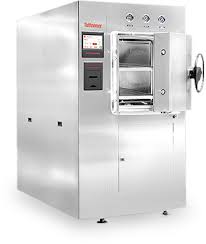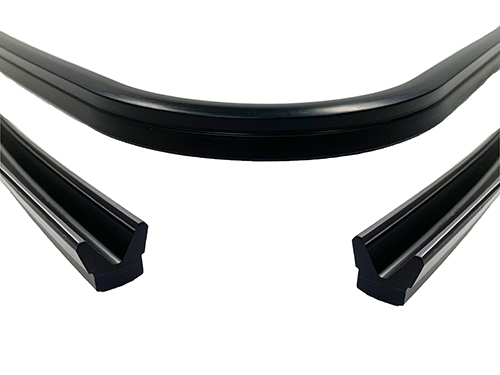Seals Eastern, Inc.
Sterilizer & Autoclave Door Seals
7182D Seals & Gaskets offer the longest service life for your autoclave
Tel: 732-747-9200
Tel: 732-747-9200
You should be getting years of leak-free service from your autoclave
and sterilizer door seals and gaskets.
 However, your sterilizer and autoclave door seals need to be
manufactured from the right material, such as 7182DTM
AFLAS. 7182D is not an FKM rubber like VitonTM or other
competing FKM's. Its unique molecular structure makes it ideal for use
in steam sterilizers and its ability to resist hydrogen peroxide and
ozone makes it ideal for long term use in low temperature sterilizers.
Autoclave and sterilizer seals are frequently made from either
silicone or EPDM. While these are good materials, they both suffer
shortcomings.
However, your sterilizer and autoclave door seals need to be
manufactured from the right material, such as 7182DTM
AFLAS. 7182D is not an FKM rubber like VitonTM or other
competing FKM's. Its unique molecular structure makes it ideal for use
in steam sterilizers and its ability to resist hydrogen peroxide and
ozone makes it ideal for long term use in low temperature sterilizers.
Autoclave and sterilizer seals are frequently made from either
silicone or EPDM. While these are good materials, they both suffer
shortcomings.
 Steam service seals, gaskets, and o-rings have traditionally been made
of EPDM. However, at temperatures exceeding 100C and in the presence
of any oxygen, EPDM seals will fail (see graph at right). Auda and
Hazleton of Exxon Chemicals Co., Elastomers Technology Division (an
historic supplier of EPDM elastomer) published a study entitled
"Ethylene Propylene Elastomer Technology for Improved High
Temperature Serviceability" regarding the life expectancy of EPDM
in hot applications. In dry heat temperatures exceeding 100C (212F),
their study demonstrated a sudden and dramatic loss of integrity
(retained tensile) and extensibility (retained elongation). The issue
for an EP door seal is that one side of the seal will experience dry
heat and will consequently deteriorate with each run cycle of the
autoclave.
Steam service seals, gaskets, and o-rings have traditionally been made
of EPDM. However, at temperatures exceeding 100C and in the presence
of any oxygen, EPDM seals will fail (see graph at right). Auda and
Hazleton of Exxon Chemicals Co., Elastomers Technology Division (an
historic supplier of EPDM elastomer) published a study entitled
"Ethylene Propylene Elastomer Technology for Improved High
Temperature Serviceability" regarding the life expectancy of EPDM
in hot applications. In dry heat temperatures exceeding 100C (212F),
their study demonstrated a sudden and dramatic loss of integrity
(retained tensile) and extensibility (retained elongation). The issue
for an EP door seal is that one side of the seal will experience dry
heat and will consequently deteriorate with each run cycle of the
autoclave.
Silicone is a condensation polymer. It is polymerized using a process
that also yields water as byproduct. The reaction follows Eq.1:
Eq.1: n(CH3)2
Si(OH)2 --> -[-(CH3)2 SiO-]-n + H2O
(ref. "The Vanderbilt Rubber Handbook", 14th
Ed.(2010)).
This means that when silicone is subject to steam (highly energized
water), the polymerization process proceeds in reverse resulting in
depolymerization of the silicone into its precursor silanol-stopped
siloxane.
 Do you want door seals that allow you to offer longer warranty
periods? 7182D Alfas does not oxidize like a standard EPDM or
depolymerize like a silicone after repeated exposure to steam. We
offer two compounds that have proven to be best-in-class for autoclave
door seals. We can manufacture any door gasket geometry to your exact
specification.
Do you want door seals that allow you to offer longer warranty
periods? 7182D Alfas does not oxidize like a standard EPDM or
depolymerize like a silicone after repeated exposure to steam. We
offer two compounds that have proven to be best-in-class for autoclave
door seals. We can manufacture any door gasket geometry to your exact
specification.
| Compound | Duro | Description |
|---|---|---|
| 7182D | 80 | Formulated AFLAS® for Steam and peroxides |
| 7182X | 80 | Formulated AFLAS® for Steam and peroxides. Exhibits Ultra-low compression set. |
If you want to maximize service life of your door seals, CONTACT US
| 1. | Elastomers for Steam Service |
| 2. | Thermal Stability of BPAF and TAIC Cured Fluoroelastomers (in super-heated water) |
Premium Quality Seals...
For a Cleaner, Safer, More Reliable World.TM